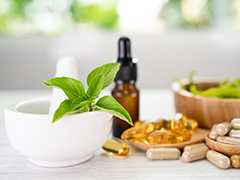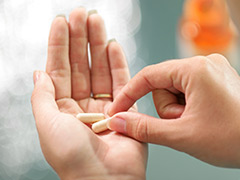What Is Vitamin B12 and How Can It Help Your Health?

B vitamins are nutrients that play important roles throughout your body. They have similar functions, from converting nutrients into energy to supporting cell growth. Perhaps one of the most well-known B vitamins is B12. But why?
How it supports your health
Vitamin B12 does it all in your body.
It helps your body produce healthy red blood cells. Red blood cells are responsible for the essential role of transporting oxygen throughout your body. Healthy red blood cells, when supported by vitamin B12, do a better job of navigating throughout your body.
There may also be a connection between vitamin B12 and your mood. It helps your body produce serotonin, a chemical responsible for regulating mood. However, more research is needed to fully understand the connection.
Healthy levels of vitamin B12 may also reduce your risk of age-related macular degeneration, or AMD. This is a condition where the macula, a small area in the center of the retina in the back of the eye, deteriorates. AMD is the number one cause of vision loss.
All B vitamins indirectly contribute to your body’s energy, as well. Vitamin B12 is no exception—it helps you feel energized all day.
How it supports healthy pregnancies
Vitamin B12 is shown to support a healthy pregnancy. According to several studies, the fetal brain depends on the vitamin for its development. Pregnant parents who are vitamin B12-deficient may have a higher risk of premature birth or miscarriage.
One of the most important B vitamins to take during pregnancy is vitamin B9, or folic acid. It can help reduce your baby’s risk for developing birth defects, including spina bifida, and is essential to help your baby produce red blood cells. In fact, taking vitamin B9 is now a routine part of care pre-pregnancy and during pregnancy.
Deficiency and your diet
Fortunately, most people in the U.S. get the recommended amounts of vitamin B12 from their diet. And most research shows that taking more than the recommended amount doesn’t offer many health benefits.
The vitamin is naturally found in animal-based foods, including meats, eggs, seafood and dairy.
However, since it’s not found in plant-based foods, people who eat a vegetarian or vegan diet can be at risk for vitamin B12 deficiency. Older adults and people with certain digestive tract conditions may be at a higher risk of vitamin B12 deficiency, too.
Vitamin B12 deficiency symptoms include anemia, fatigue, weakness, intestinal issues, nerve damage and mood issues.
Talk to your doctor if you’re worried you’re not getting enough vitamin B12 in your diet. They’ll be able to examine your health and make a recommendation.
It’s easier than ever for FEP members to get care. Visit our Ways to Get Care page to learn all the different ways you can get treatment, medical advice or your burning questions answered.
Sources:
https://www.mayoclinic.org/drugs-supplements-vitamin-b12/art-20363663
https://www.healthline.com/nutrition/vitamin-b-complex


